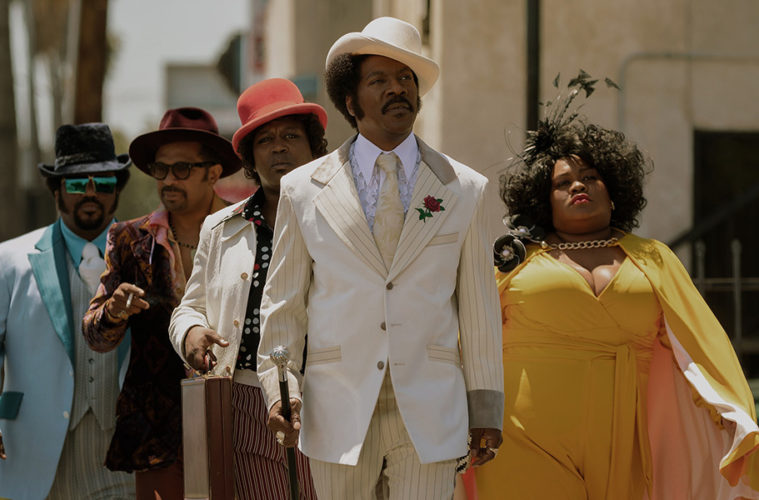The opening scene of Dolemite Is My Name shows promise: future Blaxploitation legend Rudy Ray Moore (Eddie Murphy) is trying to shuck an old record he recorded to a radio DJ (Snoop Dogg); Murphy’s iconic fast-talking quality is on display, but with a strong edge of desperation. You’re reminded of the star’s talent, and how it would be great for it to mature with him. So there comes some expectation for this film to resurrect the once-great performer. If to compare the once “the funniest man alive” Murphy who could breeze through a Carson interview in the 80s to the awkward, uncomfortable one struggling through a Letterman appearance to promote Tower Heist in 2011, one can easily see a kind of shared middle-aged malaise between him and Moore as we meet him in the film.
Desperation is certainly a quality that can separate a great “bad-movie biopic” (Ed Wood) from a lazy one (The Disaster Artist). Though sharing the same screenwriters as Tim Burton’s 1994 film–Larry Karaszewski and Scott Alexander–Craig Brewer’s Dolemite Is My Name sadly coasts on a reliable biopic structure and handsome production values. With quick-cut montages of skyrocketing comedy-record sales, meetings with clueless white executives, and near-disaster situations neatly resolved in a minute or two, the beats are suitably hit.

Taking us to Los Angeles in 1973, Moore is a struggling stand-up comedian who suddenly strikes a nerve, at least within a subculture, when he debuts a new onstage character known as Dolemite; a foul-mouthed, boldly dressed insult comic. Though there’s a new medium for the character to take, as after grimacing through a showing of Billy Wilder’s lily-white as well as nudity- and kung-fu-free The Front Page, Moore and his entourage embark on turning the raucous stand-up personality of Dolemite into a hero of the silver screen. Renovating an abandoned downtown Los Angeles hotel into their own studio backlot, they do their best with a minuscule budget, unprofessional crew, and lack of general expertise to stick it to a system not willing to speak to large swaths of America, be they African-American or overweight.
Backed up by a solid supporting cast, the clear highlight is Wesley Snipes as minor actor-turned-director D’Urville Martin. With a performance that seems to be something bordering on very strange in his brief screen time, one wishes the film could make more time for something unique beyond yet more 70s recreation.

Certainly, there’s an interesting film in here; a few of Murphy’s solitary scenes, in which he seems like an aging man talking to himself seem to hit on a kind of underlying loneliness. True, nobody wants a grey, downbeat film about the making of Dolemite, but seeing the rambunctious gags of Moore’s filmography with a winking hint of “it’s so bad… it’s good!” condescension can’t help but rub a fan of idiosyncratic, culturally-specific genre cinema the wrong way. You feel like any true story can be sanded down into acceptable biopic shape, even one as wild as Moore’s.
Which isn’t to say that it’s a film absent of certain pleasures; it’s just never daring or dangerous enough to transcend simple platitudes about representation or not giving up on your dreams. Dolemite Is My Name might push sales for a few Vinegar Syndrome Blu-rays of The Human Tornado, but it doesn’t deserve to speak for the legacy of a great movement.
Dolemite Is My Name premiered at the Toronto International Film Festival and hits theaters on October 7 and Netflix on October 25.

